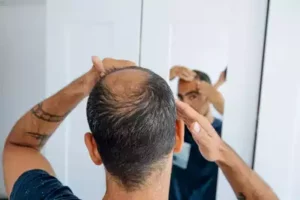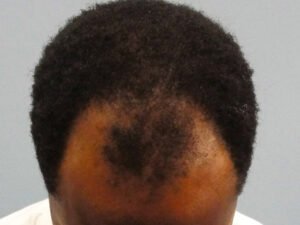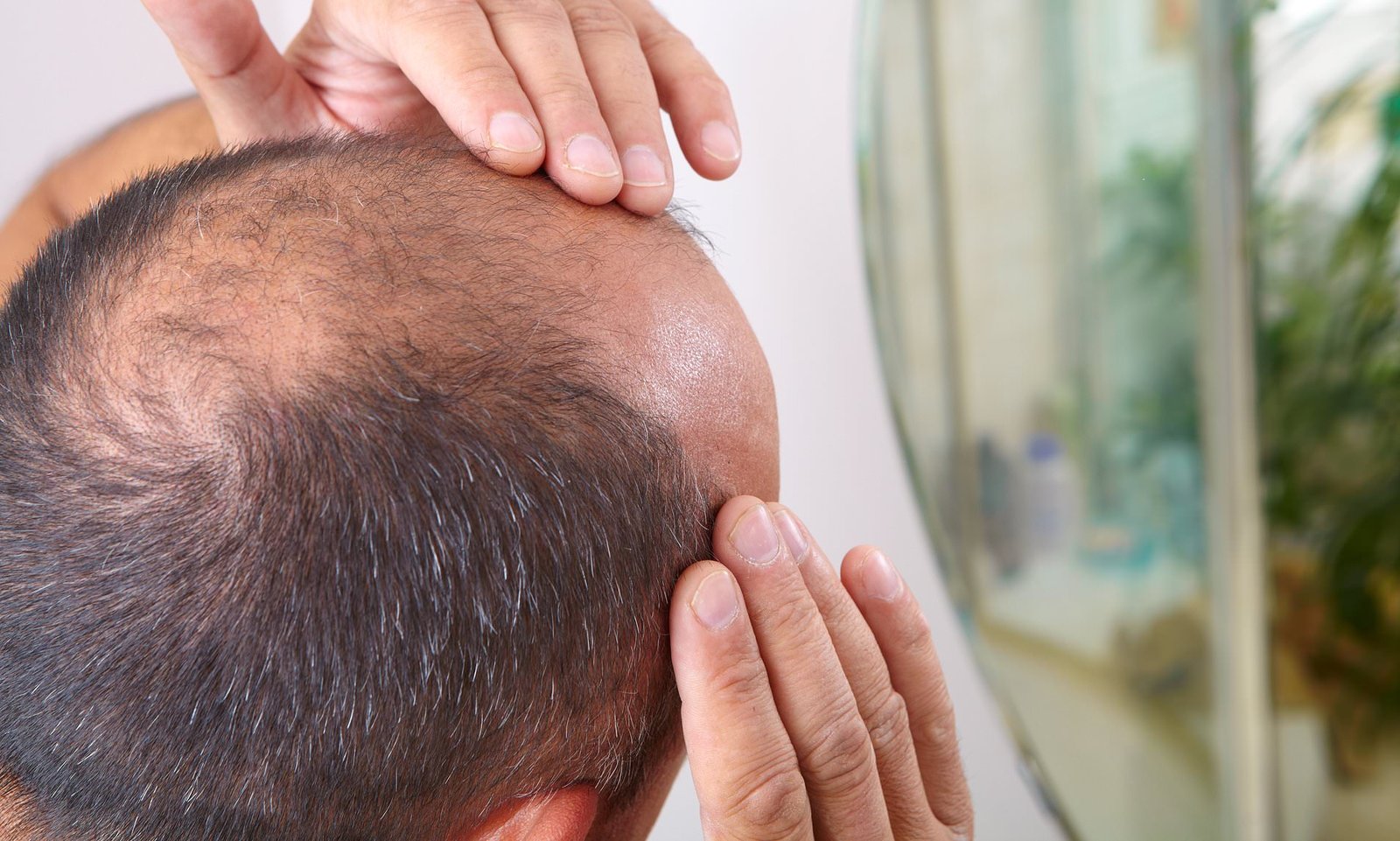Hair loss is a common issue that affects many men, often starting in their 30s. It can be a frustrating and self-conscious experience, leading to feelings of insecurity and low self-esteem.
It can manifest in various ways, including thinning hair, increased shedding, or a receding hairline.
Signs of Hair Loss:
- Thinning hair: A noticeable reduction in hair density.
- Increased shedding: Losing more hair than usual in the shower, on your pillow, or when brushing.
- Receding hairline: A receding hairline, often in an “M” or “U” shape.
In this post, we have outlined and explain the usually causes of hair loss in men, and also provided simple solutions that can work for you.
Let’s explore these factors and discover simple, everyday solutions that can make a real difference.
What are the main causes of hair loss in men?

According to research, more than half of men between 30-50 or older have signs of hair loss. Why?
It is usually not just one cause but a combination of several other factors. But guess what? You’re not alone in this.
These 4 key reasons are why men experience hair thinning as they age;
1. Genetics and Family History Play a Role
If your dad or granddad dealt with hair loss, there’s a strong chance you might, too. Hair loss often runs in families, making genetics one of the biggest factors.
Take a look at the men in your family, if they started losing their hair around your age, it’s possible you might notice the same thing happening to you.
It’s like inheriting a physical trait, only that this one affects your hairline.
2. Age and Changes in Hormones
One of the prominent causes of hair loss in men is traced to hormonal changes, particularly a rise in DHT – a hormone linked to hair loss.
This isn’t something you can avoid, but keeping an eye on your hair’s health as you hit your 30s and 40s can help.
You may start noticing thinner hair or a receding hairline. The earlier you spot it, the better chance you have of managing it.
3. Stress
Life gets more stressful as you age, and unfortunately, stress can speed up your hair loss.
When life feels overwhelming, whether it is due to work pressures, family responsibilities, and financial concerns, it’s easy to attribute these factors all play a role.
It’s not uncommon for men in their 30s to notice more hair falling out during stressful periods.
A man juggling a demanding job and raising kids might feel the effects on his hairline. Managing stress with relaxation techniques can help reduce this impact.
4. Poor Scalp Care

Another common factor that causes hair loss in men is connected to scalp problems. Many men don’t think about their scalp health until it’s too late.
A dry, flaky, or unhealthy scalp suggests dandruffs and can weaken the hair in turn leading to hair loss.
If you’re not paying attention to how clean or hydrated your scalp is, you could be making things worse for your hair.
Regularly washing your hair and keeping your scalp moisturized can prevent unnecessary hair thinning.
5. Bad hair grooming habits
Poor grooming habits is one of the causes of hair loss in men. When you continuously style your hair with flat irons or hair dryers, it can damage your hair follicles.
Tight hairstyles like braids, dreadlocks, or tight fades can pull your hair out while aggressive combing or brushing can break the hair strands.
What Daily habits can contribute to hair loss in men?
Hair loss can sometimes be linked to certain ignored everyday habits. Asides genetics, there are small lifestyle choices that can impact your hair.
These 4 common habits are what could be the causes of hair loss in men:
1. Eating unhealthy foods

A poor diet can rob your hair of it’s essential nutrients. If every time, you’re always grabbing fast food or skipping meals just because you’re a busy man or have to lose weight, your hair might become weak and start to thin.
Eating more home-cooked meals with proteins, veggies, and fruits can make a big difference.
2. Lack of Sleep
Sleep is how your body rejuvenates and repairs itself, including your hair. If you stay up late watching TV or working on projects, you might notice your hair growing thinner.
And without proper rest, hair growth slows down. Aim for 7-8 hours of sleep each night to give your body and hair time to recover.
3. Using Harsh Hair Products
Strong shampoos or chemical-laden products can strip your hair of its natural oils, leading to breakage.
Especially if you’re the man who uses heavy-duty styling gels or dyes his hair regularly, switching to gentle, sulphate-free products can help protect your hair’s health.
4. Smoking:

Smoking isn’t just bad for your lungs; it also affects your hair. The toxins in cigarettes reduce blood flow to the scalp, making it harder for hair to grow.
A man who smokes regularly might see a receding hairline or thinner patches in. Quitting smoking not only improves overall health but also helps preserve your hair.
Health issues that affect hair loss in men over 30
Health problems can also be a significant factor in hair thinning, even though age and heredity are the most frequent causes of hair loss.
Watch out for these 4 medical conditions:
1. Thyroid Disorders
The butterfly shaped gland at your neck called the thyroid gland can be responsible for affecting the hairs on your head.
When your thyroid gland produces too much or too little thyroid hormone, your hair growth cycle might change.
For example, if a man feels unusually tired or is gaining weight without explanation, and his hair is thinning, it might be linked to his thyroid.
With Regular medical tests, you can detect thyroid problems early, giving you a better chance to manage hair loss.
2. Scalp Infections
Fungal infections like ringworm can damage your scalp and cause hair loss. If you start noticing red, itchy patches on your scalp or a bald spot, it is a sign that you might be dealing with an infection.
Keeping your scalp clean and seeing a doctor early for treatment can prevent further damage and restore hair health.
3. Autoimmune Diseases
If you start experiencing sudden hair loss that leaves bald spots in various places on your head, you may a condition called alopecia areata.
This is a condition whereby your body’s immune system starts attacking your hair follicles causing small patches of your hair to fall out.
While this can be alarming, it is vital to note that this condition isn’t contagious neither is it painful.
Consulting with a doctor and seeking early treatment can sometimes help manage the condition. Your hair may grow back, but it may fall out again.
4. Diabetes
High blood sugar levels can damage blood vessels, reducing the blood flow to hair follicles. This can lead to hair loss.
A man who is living with diabetes might notice that his hair is growing slower or becoming thinner over time.
By managing blood sugar levels and maintaining a healthy lifestyle, he can help reduce the risk of hair loss related to diabetes.
5. Side effects of Drugs
Certain drugs have different side effects and most times, it affects hair growth, usually leading to thinning of the hair follicles. These drugs are taken for:
· Cancer:
Early signs of cancer can cause hair loss, and radiation treatment or chemotherapy causes even more widespread hair loss, but usually with time, the hair grows back after treatment ends.
· Depression:
Certain antidepressants taken to help a depressed man may impact hormone levels causes hair follicles to shed.
But consistency in using milder medications prescribed by your therapist along with gentle hair care can help supports the hair growth stage.
· Arthritis:
Some drugs taken for rheumatoid arthritis can increase the risk of losing your hair. But with lower dosage, the symptoms may gradually resolve alongside consult from your doctor and dermatologist.
Practical solutions to reduce hair loss in men
Hair loss can often be managed by making simple changes at home.
Here are some practical simple hair care tips that can help reduce hair thinning and improve your overall health for a better hair;
· Be gentle when brushing your hair:
Avoid pulling or tugging on your hair, instead use a wide-tooth comb to prevent breakage.
· Limit heat styling:
Reduce the use of blow dryers, straighteners, and curling irons, as excessive heat can damage your hair.
· Use natural products:
Go for shampoos and conditioners without harsh chemicals like sulphates. Natural ingredients like aloe-vera or coconut oil are great for maintaining a healthy scalp.
· Pat hair dry:
After washing, gently pat your hair with a towel instead of rubbing it, which can cause the hair to break.
· Protecting hair while sleeping:
One way to reduce hair loss from tangling, pulling, and friction is to use a silk or satin pillowcase.
Leaving wet hair on your head before bed can weaken and cause it to break. When your hair is wet, it is in a vulnerable state.
· Exercise regularly:
Physical activity increases blood flow to the scalp, promoting hair growth.
· Get enough sleep:
Aim for at least 7-8 hours of sleep per night, as your body needs rest to repair and grow healthy hair.
· Stay hydrated:
Drink plenty of water throughout the day to keep your hair hydrated and healthy.
· Eat a balanced diet:
Include fruits, vegetables, and proteins in your meals to nourish your hair from within.
How Men Can Prevent Future Hair Loss and Maintain Hair Health?
1. Wash your hair regularly:

Clean your scalp with a gentle shampoo to remove dirt and any oil build up.
2. Avoid tight hairstyles:
For men that keep long hair, constantly pulling your hair back in tight styles can cause it to weaken and fall out. It’s best you plait it freely or tie it loosely.
3. Protect your hair from the sun:
Prolonged sun exposure can damage your hair, instead wear a hat or use hair sunscreen when outdoors.
4. Massage your scalp:
Regular scalp massages can improve blood circulation, which promotes hair growth and strengthens follicles.
5. Manage stress:
Practice relaxation techniques like deep breathing or regular exercise to reduce stress-induced hair loss.

Conclusion
Hair loss is a common concern among men, but it’s important to remember that it’s not necessarily a sign of serious health issues.
Understanding these underlying causes of hair loss in men and seeking professional advice can help you manage hair loss and maintain a healthy scalp.
Key Takeaways:
· Hair loss is a common issue:
Many men experience hair loss, especially as they age.
· Identify the underlying cause:
Consult with a healthcare professional to determine the root cause of your hair loss.
· Explore treatment options:
There are various treatment options available, including medications, hair transplants, and lifestyle changes.
· Prioritize self-care:
Maintain a healthy lifestyle, manage stress, and address any underlying medical conditions.
Remember, you’re not alone. Hair loss is a common experience, and seeking support and guidance can help you manage the challenges and maintain a positive outlook.
____________________
At Enthusiast Express, our mission is to support men to achieve optimal health and wellness.
We’re dedicated to providing practical, relatable advice that helps you tackle challenges like hair loss and embrace a healthier lifestyle.
Our goal is to empower you with the knowledge and motivation needed to make informed decisions and stay on track.
Join Our Community
Connect with others who share your health goals, exchange practical tips, and receive the encouragement you need.

